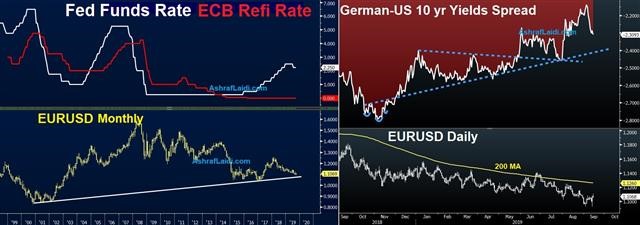Will dramatic moves by ECB help the euro rebound, asks Adam Button.
Can the euro gain despite the latest rate cut? Before we cover the aftermath of Thursday's drama-filled ECB decision, let's backtrack for a bit. A month ago, Bank of Finland chief ECB member Olli Rehn said it was important to come up with a significant and impactful policy package in September. "When you're working with financial markets, it's often better to overshoot than undershoot, and better to have a very strong package of policy measures than to tinker," he said. The euro had slumped on those headlines at the time on the expectation of a highly dovish hint. The problem with such remarks is they remove the element of surprise later down the line.

So, the ECB went on a coordinated disinformation campaign. Speaker after speaker over the past month went on the offensive. Dutch central bank chief Knot said there was no need to resume QE, Germany's Weidmann agreed, and others spoke along the same lines. A series of leaks continued right up until the decision that suggested QE may not return, leaving the market off balance.
That set the stage for Draghi to deliver a Thursday surprise of open-ended QE and open-ended guidance. Draghi opted for a 10-bp rate cut --not the 20 basis points -- that many were hoping for-- but emphasized in the press conference that downside risks remained. The forecast for 2020 inflation was lowered to 1.0% from 1.4%, suggesting that any trouble will be met by action.
Eurozone government yields fell alongside Italian yields down as much as 20 basis points to a record +0.75%. Yet the euro hung in there, which begs the question: Do interest rate differentials matter?
The answer could suggest that they don't. In 2007 you could buy the New Zealand dollar and sell the yen while collecting 8% in carry. Today, even at the extremes, the differences in developed markets are 200 basis points.
Flows vs Differentials?
Increasingly, money is chasing growth and/or value. That's always been the case, but it brings us back to the role of central banks today. The ECB's manufactured surprise should be viewed less through the lens of what it does mechanically, and more so on how it affects confidence and growth. In that sense, tiering for Eurozone banks (exempting banks with particular reserves from negative rates) will be a crucially positive step, helping to restore (or at least preserve) profitability in the banking sector. This factor helps explains why European banks sector shot up immediately after the tiering announcement from the ECB at 12:45 pm London time, which in turn proves euro-positive despite the latest rate cut.
Asset managers looking for bargains will not resist the temptation to buy beaten down European bank stocks with the decent internal fundamentals and some accommodation on negative rates from the ECB. EURUSD is on its way to complete its two-weekly gain. It has now three consecutive weekly gains since June 2018. Could next week prove positive in the aftermath of the Fed?
The fiscal path
Mario Draghi is now nearly done at the ECB. He engineered policies that were unthinkable on his arrival. He fought against the panic of a Eurozone breakup, and did everything he could within his mandate. Throughout his tenure, he asked for governments to do more. He made that call again on Thursday.
The fiscal argument has no doubt merit for it to be included Christine Lagarde’s playbook. She must draw a line at some point, warning that the risks of the ECB pushing further into experimental policy outweighs the rewards. With that, she will hand the baton to the fiscal side. The market is already looking ahead to this but the early take is that governments won't respond until they're already in recession. By that time, it will be too late.
Adam Button is co-owner and managing director of ForexLive.com and a contributor at AshrafLaidi.com. You can see Ashraf’s daily analysis at www.AshrafLaidi.com and sign up for the Premium Insights. Ashraf's Tweet on indices here.





















